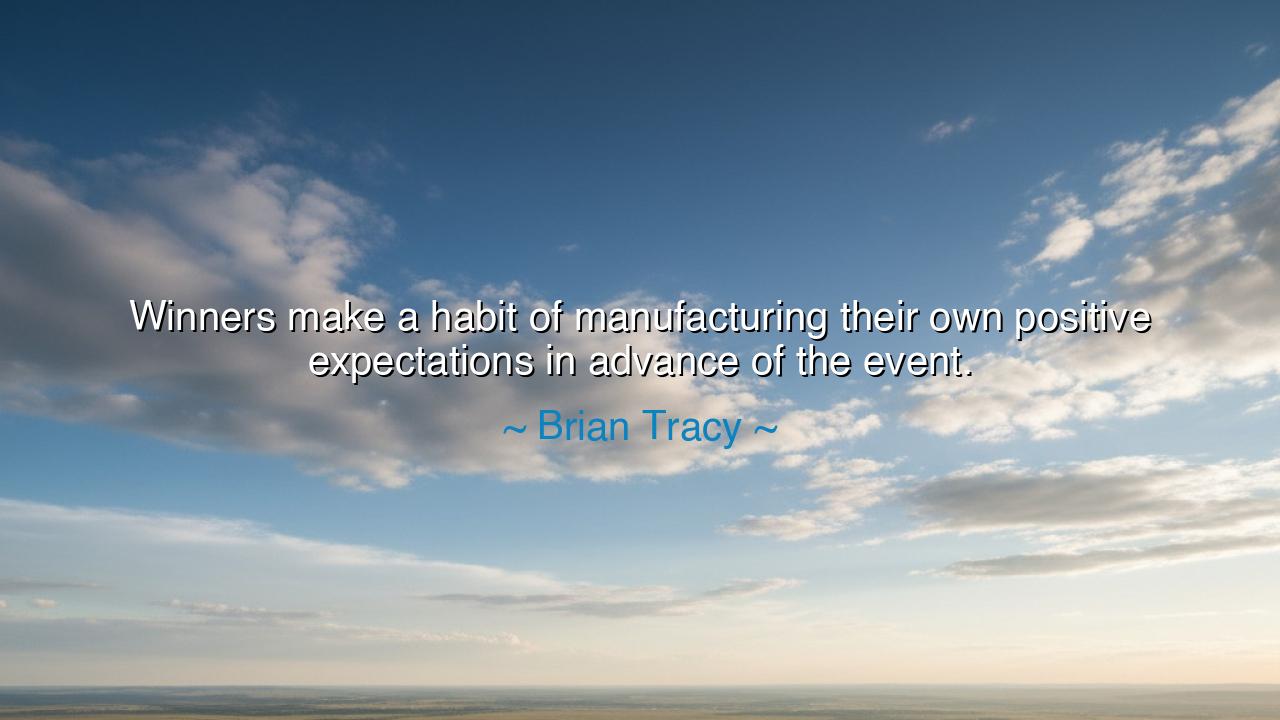
Winners make a habit of manufacturing their own positive
Winners make a habit of manufacturing their own positive expectations in advance of the event.






Hear, O seekers of victory, the words of Brian Tracy, who declared: “Winners make a habit of manufacturing their own positive expectations in advance of the event.” These words shine like a torch in the darkness of doubt. They remind us that triumph is not born of chance nor left to fate—it is forged in the mind before the battle is ever fought. The one who walks into the field of struggle carrying positive expectations has already claimed the seed of victory, while the one who carries fear is defeated before the first step.
The meaning of this teaching is that success is shaped by the inner vision long before it is seen in the outer world. The winner is not one who stumbles blindly into glory, but one who prepares their spirit with conviction, discipline, and unwavering belief. To “manufacture” expectations is to choose deliberately what the heart shall believe, to rehearse success in the mind until it becomes reality in the world. Thus, victory is no accident—it is the natural fruit of preparation joined with positive belief.
The origin of these words lies in Tracy’s lifelong study of achievement and personal growth. He observed the patterns of those who rose above mediocrity, and he saw that their greatness was not luck but habit. They trained themselves to expect the best, to visualize success, to shape their inner dialogue so that doubt found no dwelling place. His words echo the wisdom of the ancients, who taught that as a man thinks, so he becomes. Expectation is the architect of destiny.
Consider the story of Alexander the Great, who led armies across continents. Before each campaign, he would speak to his men not of fear but of conquest, painting vivid pictures of victory in their minds. His positive expectations became their own, and together they accomplished feats that seemed impossible. Had he filled their hearts with hesitation, their resolve would have withered. Instead, his vision inspired them to endure hunger, hardship, and endless miles, until the world itself bowed before their courage.
Think also of Thomas Edison, who pursued the creation of the electric light. Thousands of times he failed, yet each failure he greeted with the expectation of eventual success. He did not say, “It cannot be done.” Instead, he declared, “I have found another way that will not work.” His habit of positive expectation kept him pressing forward, and at last, light was born from persistence. Without this inner victory, the outer invention would never have seen the day.
O children of tomorrow, learn this: life gives to you what you expect of it. The one who expects defeat will find it in every corner; the one who expects growth will find lessons in every failure. The habit of expectation shapes not only the outcome but the journey itself. For expectation determines courage, courage determines effort, and effort determines destiny. Guard your mind, therefore, for it is the seedbed of your future.
Practical wisdom calls you: before each endeavor—be it study, labor, or love—pause and set your expectation. Speak to yourself words of victory, not defeat. Visualize the outcome you desire, not the failure you fear. Make this practice daily, until your mind itself becomes a forge of positive belief. Surround yourself with companions who lift expectation, not those who drag it down with cynicism. In this way, your thoughts will prepare the soil, and your deeds will bring forth the harvest.
Therefore remember the counsel of Brian Tracy: “Winners make a habit of manufacturing their own positive expectations in advance of the event.” Let it be your guide. For the world does not first grant victory to the body but to the spirit. Expect greatness, prepare for greatness, and act with greatness—and in time, greatness shall come. The true battle is won within, and the one who masters their expectation shall walk the earth as a conqueror, unbroken and unstoppable.
––






MTTruong Minh Thang
I find this quote motivating, but I’m also curious about how it applies in group settings. Can a team collectively ‘manufacture’ positive expectations the same way an individual can? It seems like shared optimism could boost morale and performance, but what if not everyone believes in the same outcome? I’d love to explore how leaders or coaches can use this principle to influence mindset without creating false hope.
DGDuy Gaming
This statement makes me think about how much of winning is mental rather than physical or circumstantial. If successful people train their minds to expect good results, it suggests that confidence might be a stronger predictor of achievement than talent alone. But does that mean failure comes from negative expectations? I wonder if this mindset could backfire when things don’t go as planned—does disappointment hit harder when expectations are too high?
HHOng Hoa Huan
I like how this quote reframes success as something proactive, not accidental. But I wonder—how do you ‘manufacture’ positive expectations without slipping into unrealistic thinking? It sounds empowering, yet also challenging for people who struggle with self-doubt or anxiety. Is there a difference between healthy expectation-setting and toxic positivity? Maybe the real skill lies in believing in the best outcome while still preparing for obstacles along the way.
KLTran Khanh Ly
This idea really caught my attention because it connects success to mindset preparation. It makes me think about whether optimism and expectation can actually influence outcomes or just how we perceive them. Do you think creating positive expectations genuinely changes performance, like a self-fulfilling prophecy, or does it just make failure easier to handle? I’m curious if this approach works equally well in competitive, uncertain, or high-pressure situations.